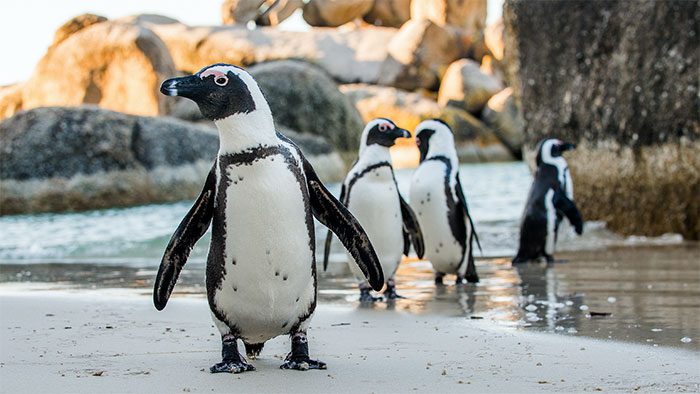A breeding facility in Cape Town is currently raising birds to be released into a newly established sanctuary for penguins. This is the farm of the South African Non-Profit Organization for Coastal Bird Conservation (referred to as the Organization), where hundreds of penguins are nurtured and cared for after being injured or abandoned in the wild. Upon entering, visitors must step onto a mat soaked in antibacterial liquid – one of the first signs indicating that this place takes environmental protection very seriously. It is a sanctuary for African penguins.
Although this conservation center is a safe haven for African penguins, the entire species is facing severe challenges. Over the past century, the population of African penguins has dramatically decreased from about one million breeding pairs in the early 1900s to under 10,000 by 2023 due to deteriorating environmental conditions. The penguins’ primary food sources have diminished due to increased fishing and climate change.

African penguin.
The climate crisis has also caused more frequent and extreme weather events in South Africa, such as flooding and heatwaves, leading to more and more parent penguins abandoning their eggs in search of shelter.
Staff at the Organization are working hard to rescue these penguins with the goal of releasing them back to Cape – one of their former territories. Additionally, some penguins are being relocated to the De Hoop Nature Reserve. There, scientists and conservationists are working to establish a new colony that they hope will become a stronghold for the entire species of African penguins.
It is difficult to pinpoint the primary threat to the survival of African penguins: oil spills, avian influenza, and extreme weather events have devastated many of their habitats across South Africa. These chronic issues, combined with rare incidents, have pushed African penguins, already in a precarious position, closer to the brink of extinction: In 2021, a swarm of bees killed over 60 African penguins on the famous Boulders Beach in Cape Town, and a year later, two husky dogs killed 19 penguins in the same area.
However, scientists believe that one of the main reasons for the decline of this species is overfishing of sardines and anchovies, which are the primary food sources for the penguins.
Shanet Rutgers, a veterinarian at the Two Oceans Aquarium in South Africa, stated that to make a living, impoverished fishermen around the beaches have gradually formed a gillnet fishing industry. They use nets to create a wall around a school of fish, preventing penguins from catching any. Rutgers remarked, “When they overfish the ocean, they leave little for other species to feed on.” In other words, humans have disrupted the food chain in the ecosystem of South Africa, and while penguins are not directly hunted, they have become indirect victims of human activity.
Over millions of years, African penguins have developed the ability to sense signals in the water to detect prey fish, such as low surface temperatures and high chlorophyll levels. However, this issue has been complicated by climate change, which has affected fish populations in waters off the coast of Namibia and western South Africa. These areas were originally the “fishing grounds” that penguins are programmed to seek. Consequently, climate change has pushed penguins into what scientists refer to as a “trap of ecology.”
Katta Ludynia, the lead researcher at the Organization, explained: “It’s like following signs to a restaurant and when you drive there, you find the restaurant is closed while you’re starving.”
To help prevent further losses in the food supply available to penguins, the South African government took action in August. They announced a ban on commercial and recreational fishing activities for 10 years starting January 2024 in foraging areas surrounding six main breeding sites of South African penguins. The South African government decided to establish these conservation areas based on recommendations from scientific reports in 2023 that outlined the status of African penguins. The report was authored by a group of international penguin experts, economists, and fisheries representatives, and was commissioned by the Department of Forestry, Fisheries, and the Environment of South Africa.
However, environmental non-profit organizations, including the Organization, argue that these areas are still not large enough to have a significant impact on protecting the food supply for penguins. Currently, the Organization and other conservation groups such as BirdLife South Africa and the World Wildlife Fund – South Africa are negotiating with fishing groups to establish a larger conservation area.


















































